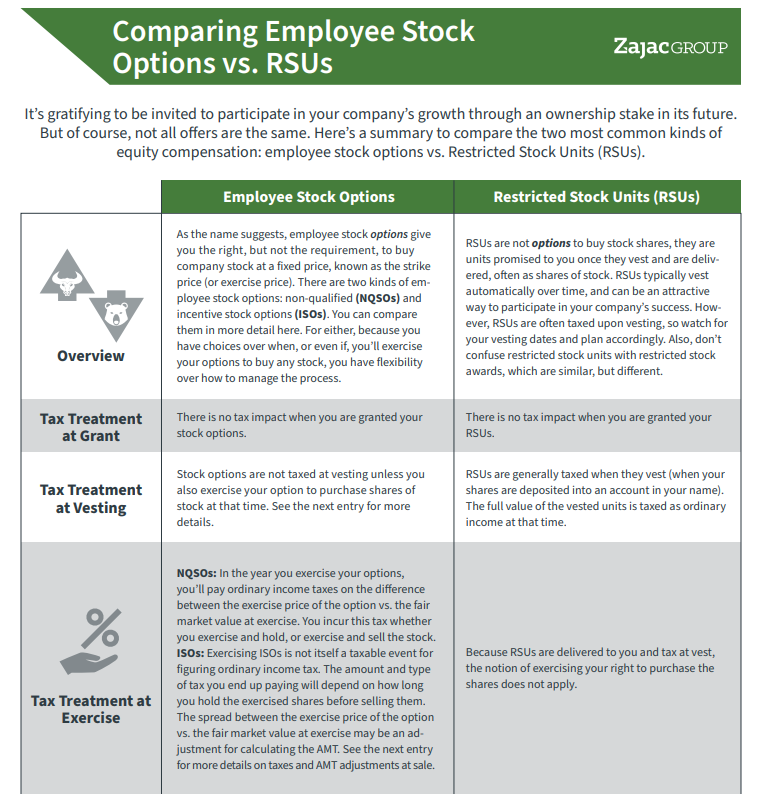Restricted stock units are often considered the most straightforward type of equity compensation. Unlike other ways that employees can receive shares of company stock, restricted stock units (or RSUs) often have a largely automated process for granting, vesting, and taxation.
Once vested and settled, the fair market value of the RSUs is taxed and the amount owed is withheld from the RSUs themselves. The after-tax units, or the shares you actually receive, are then deposited into a brokerage account.
This requires little action on your part, but the relative simplicity of RSUs does not mean that you can turn a blind eye to the process. While you may not need to make as many decisions as you would with other types of equity compensation, there are still two key reasons why you need to pay attention to your vesting RSUs:
- The automatic withholding on your RSUs may not be high enough to cover your total tax bill.
- Vesting and settlement of your RSUs may result in you receiving shares of stock, which could introduce more concentration or volatility into your overall investment portfolio than you truly want.
While RSUs may be fairly straightforward, you do need to manage a number of financial issues that they can bring up, including impacts to cash flow, overall taxes owed, and the makeup of your investments. The right choices will depend on what best aligns with your financial goals and objectives.
Taxes on Your RSUs May Be Automatically Withheld – But It Might Not Be Enough to Cover Your Bill
When your restricted stock units vest and are no longer subject to forfeiture, the full value is considered compensation income. That means the value of your RSUs is subject to ordinary income, Social Security, and Medicare taxes upon vesting.
The actual tax rate and tax amount you will pay on this income will be calculated when you file your tax return at year-end (see more on these rates below). But in an effort to prepare for the pending tax bill and as part of the required process, your company will automatically withhold income taxes on the taxable amount when the RSUs settle.
COMPARISON GUIDE
Not All Stock Offers are the Same! Here's a helpful comparison between two of the most common employee stock options.
In 2021, the statutory withholding rate is 22% for income under $1,000,000 and 37% for income over $1,000,000. Taxes for Social Security, Medicare, and state income tax, if applicable, are also withheld.
Let’s assume that you have 10,000 vested RSUs with a fair market value of $25 per share. That makes the total taxable value of the vested shares $250,000. Here’s a projection of how much you’d owe in taxes in this scenario:
| Federal Tax | 22% | $55,000.00 |
| Medicare Tax | 1.45% | $3,625.00 |
| Social Security (Up to Income Limits)* | 6.20% | $8,853.60 |
| Total Tax Withheld | $67,478.60 |
*in 2021, the Social Security limit is $142,800
$67,478.60 is the amount that would be withheld here – but keep in mind, you may owe more depending on your tax bracket. While 22% is the standard, depending on income, you could owe up to 37%.
To cover the amount withheld from the total value for taxes, RSUs are often settled with a share-withholding. A share-withholding means that some vested RSUs will be withheld to cover the statutory tax withholding, and the remaining will be given to you.
To cover the $67,478.60 in our example, we can divide the projected tax withholding by the current stock price:
$67,478.60 Taxes Withheld / $25 Fair Market Value of Shares = 2,670 Shares Withheld (rounded up)
If you were granted 10,000 shares but a share-withholding was used to cover the taxes owed, you’d actually receive 7,330 shares into your investment account. This assumes the RSUs settle as stock; sometimes an RSU plan document will allow for RSUs to be settled as a cash payment instead.
Figuring Your Ordinary Income Tax on Vested Restricted Stock Units
Even though tax is withheld at vest at statutory withholding rates, the amount of withholding may or may not be enough to cover the full tax liability due on the vested restricted stock units.
Vested restricted stock units are taxed as compensation income and subject to the same tax rules as is your regular wage income. Therefore, to understand the tax impact, it makes sense to understand how your regular wage income is taxed.
In the US, regular wage income is taxed based on the graded tax system of the US tax code. In 2021, the tax rates are as follow:
| Rate | For Single Individuals | For Married Individuals Filing Joint Returns |
| 10% | Up to $9,950 | Up to $19,900 |
| 12% | $9,951 to $40,525 | $19,901 to $81,050 |
| 22% | $40,526 to $86,375 | $81,051 to $172,750 |
| 24% | $86,376 to $164,925 | $172,751 to $329,850 |
| 32% | $164,926 to $209,425 | $329,851 to $418,850 |
| 35% | $209,426 to $523,600 | $418,851 to $628,300 |
| 37% | $523,601 or more | $628,301 or more |
Assuming your status on your tax return is married filing jointly, the first $19,900 of your taxable income is subject to a 10% tax rate. Taxable income between $19,901 and $81,050 is taxed at 12%, taxable income between $81,051 and $172,750 is taxed at 22%, and so on.
The value of your RSUs is essentially “stacked” on top of other income during the calendar year. That value is then taxed at the corresponding rate, subject to your total income as figured on a tax return.
Continuing our example, let’s assume you’re married filing jointly and your household taxable income for the year is $638,301. From your vested RSUs, you also have $250,000 worth of taxable income. Using the tax chart above, we can see that the $250,000 of vested RSUs will be taxed at the highest tax bracket of 37%.
In this example, the actual tax due would be $92,500 (= $250,000 x 37%). But the statutory withholding on your RSUs only accounted for $67,478.60. You’d still owe $25,021.40 come tax time – which could be an unpleasant and unaffordable surprise unless you pay attention to your RSUs and plan ahead.
RSUs May Be “Simpler” Than Other Equity Comp, But They Still Require Proactive Planning
When your RSUs vest, you need to plan for the potential tax and financial planning implications that may arise.
First, you should take note of how much income will be included on your tax return and how much income tax was withheld once you receive your RSUs.
Armed with this information, you can estimate if a sufficient amount was initially withheld from the value of your RSUs – or if you’ll owe more in taxes when you file. If you realize the automated withholding of 22% was not enough, you can make informed decisions about paying for the pending tax due with other assets or selling off vested shares to cover the bill.
Beyond tax planning, you should decide whether or not holding vested restricted stock units makes sense for your financial plan. It’s prudent to consider whether or not holding the vested RSU stock beyond the vesting date makes sense from an investment management and concentration risk point of view. In fact, one could argue that selling RSUs immediately as they vest is a good strategy as part of a sound financial plan.










0 Comments
Trackbacks/Pingbacks